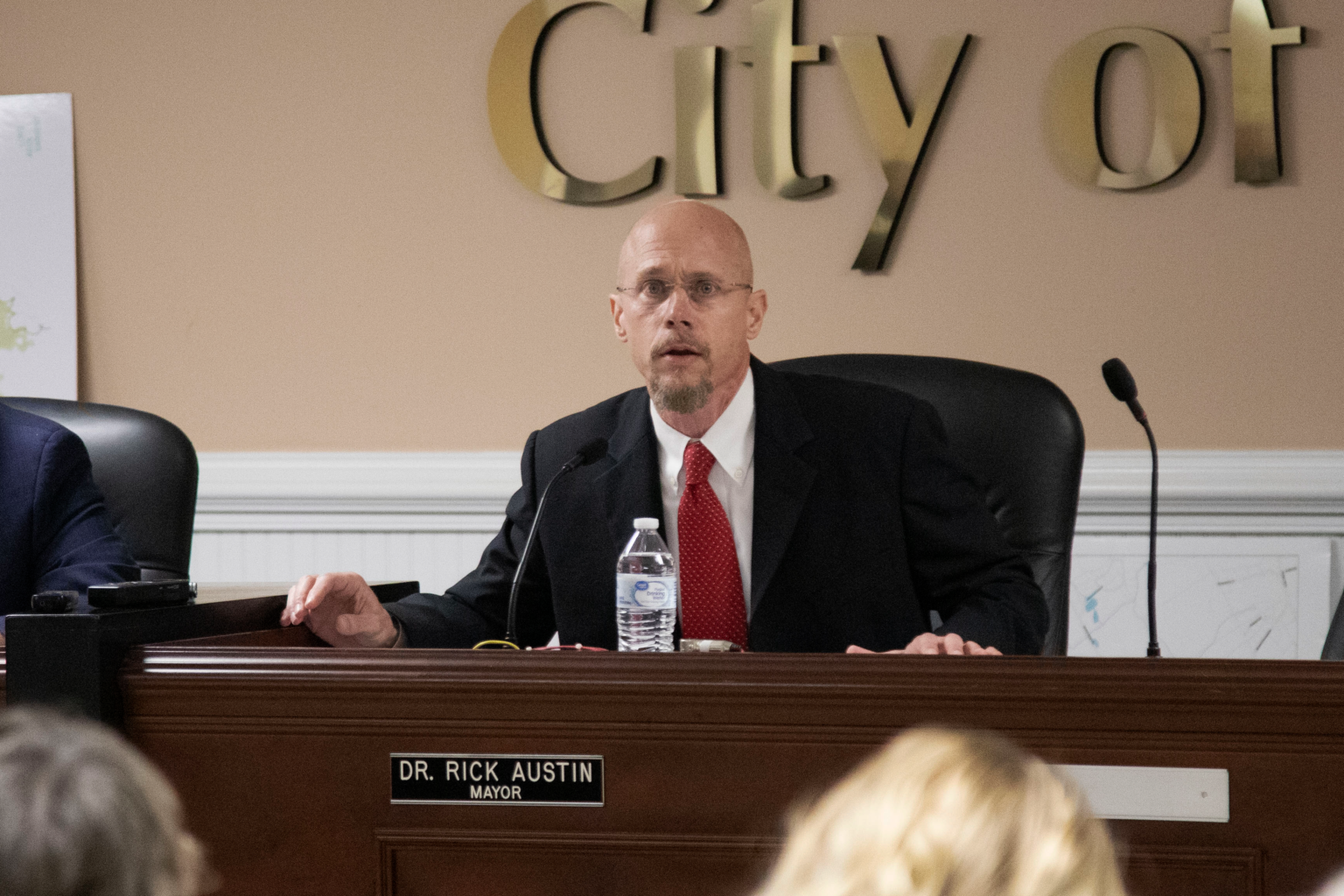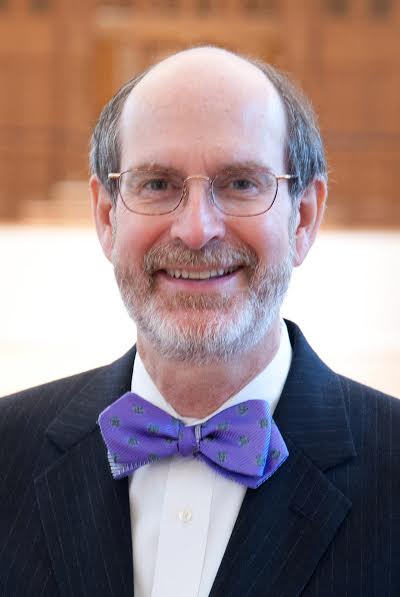
Demorest Mayor Rick Austin is suing the top leadership of Piedmont University for alleged conspiracy. Austin claims Piedmont president Dr. James Mellichamp and members of the Executive Committee of the Board of Trustees unlawfully conspired to remove him from his position as a tenured biology professor at the school and his elected position as mayor of Demorest in retaliation for an affidavit he submitted in a former colleague’s wrongful termination lawsuit.
Austin’s attorney, Matthew Billips, of Atlanta, filed the lawsuit last week in U.S. District Court for the Northern District of Georgia. The suit states, since that subpoenaed testimony and affidavit, Austin has been subjected “to numerous retaliatory acts by Piedmont College, Dr. James Mellichamp, the officers of Piedmont College, and others associated with, or employed by, Piedmont College.” [The college has since changed its name to Piedmont University.]

In addition to Mellichamp, the lawsuit names several high-profile defendants, including Thomas “Gus” Arrendale, Tom Hensley, Stewart Swanson, Dock Sisk, Dwight Evans, Mylle Mangum, and attorney Patrick McKee. All but McKee are members of the school’s executive committee. McKee is the attorney representing Piedmont in a fraud and racketeering lawsuit the school filed in November 2020 against Austin, the City of Demorest, its police chief, and five former elected and appointed city officials. Billips asserts Mellichamp and McKee filed that lawsuit, with the executive committee’s knowledge and consent, to retaliate against Austin.
Alleged misconduct
Two years ago, Austin raised allegations of misconduct against President Mellichamp in an affidavit he filed in the Wainberg v. Piedmont College lawsuit.
Austin testified that during his time as a student at Piedmont College, he observed Dr. Mellichamp engage in “inappropriate conduct with students,” including “purchasing alcohol for minors, drinking with students, at times to the point of visible intoxication, and taking students to a gay bar on a college sanctioned trip.”
After joining the faculty, Austin says Mellichamp made comments to him, both in oral and written communication, that were sexual in nature. He testified to an incident in 2011 in which Mellichamp allegedly sexually assaulted him, grabbing his buttocks as he stood outside the then president’s office. [Mellichamp was named Piedmont president in 2012.]
Austin brought this same affidavit forward in his federal lawsuit against the college, claiming Piedmont did not investigate his claims of sexual harassment and assault and, instead, chose to retaliate against him for making them.
In an affidavit, Piedmont alumnus, Ben Cash, says he stopped recommending his alma mater to others after the alleged assault. While he did not witness the incident, he says he learned of it shortly after it happened and was aware the school did not act on Austin’s complaints.

“My subsequent course of conduct was to not recommend to my daughter and other students to consider Piedmont College while Dr. James Mellichamp remained a part of the leadership administration,” Cash testified.
Another Piedmont alum, Nicolai Peek, testified that Mellichamp made sexual comments about pedestrians to Peek and three other students during a school trip.
The lawsuit also includes an affidavit from a former student whose name was redacted due to privacy concerns under the Family Educational Rights and Privacy Act. That student claimed that in the Fall of 2017, he had an “uncomfortable” encounter with Mellichamp as they walked past each other on campus. He says the college president “moved his eyes up and down my pelvic area in a sexually suggestive manner, made intense eye contact and then asked me in a sexually provocative way: ‘How are YOU today.'”
The student went on to state that he was “caught off guard” by the incident, adding, “it makes me uncomfortable because I don’t think any President should be making those types of sexual suggestions towards students.”
An illicit affair and inaction
While it is unclear whether Peek or the other student filed complaints with Piedmont administrators over Mellichamp’s alleged behavior, another alumnus claims it was only after his parents got involved in his situation that the school acted.
Paul King-Allen enrolled as a freshman at Piedmont in the early 90s. He was 17 at the time and says his college voice teacher began a sexual relationship with him. When King-Allen tried to break off the relationship, he says the professor began harassing and stalking him. He says Mellichamp, who was chair of the music department at the time, was aware of the situation.
“I reached out to Dr. Mellichamp for help on several occasions to get him to stop Dr. Joseph Jackson sexually harassing me, but Dr. Mellichamp did nothing to solve the problem,” King-Allen states in his affidavit.
Once King-Allen’s parents got involved, Piedmont fired Dr. Jackson but did not fire Dr. Mellichamp.
“My life was made very difficult because I reported it,” King-Allen states. “I had to drop out of Piedmont College that semester because this was so traumatic and transfer to another college for some time.”
King-Allen later returned to Piedmont to finish his degree but says the incident had a lasting impact on him.
“The predatory conduct of Dr. Joseph Jackson that was tacitly approved by Dr. Mellichamp because he failed to stop his behavior when I asked for help, deeply affected my life in a traumatic way.”
A recurring theme
Intertwined with the alleged misconduct and abuse is the recurring theme of retaliation. The lawsuit that preceded Austin’s legal troubles with Piedmont is rooted in it.
In 2019, tenured biology professor Robert Wainberg sued Piedmont for wrongful termination. Wainberg claimed that Piedmont fired him in retaliation for speaking out against “the administration’s violations of academic integrity” and that the administration had long been attempting to terminate his employment. Austin testified to his belief that the college did fire Wainberg for that reason and submitted his affidavit in the case despite his own concerns over “retaliation from the President.”
Since then, Billips says his client has been retaliated against in several ways, including being sued by the college, along with the City of Demorest and five other current and former city officials.
On December 18, 2020, McKee filed an amended complaint in Habersham County Superior Court on behalf of Piedmont. It directly speaks to Austin’s affidavit as one of the reasons the college sued him.
Billips also cites several other examples of alleged retaliation, including an email from the Dean of Piedmont’s School of Arts & Sciences, Steven Nimmo, in which Nimmo reportedly asked the department chair Dr. Elaine Bailey if she had “taken care of ‘the biology problem'” — a direct reference, Billips claims, to Rick Austin. The email was sent the day after Austin was deposed in the Robert Wainberg case.
The lawsuit also claims Mellichamp broke the law when he attached a copy of Austin’s son’s Piedmont College disciplinary records to a court affidavit. And the lawsuit states that on June 13, 2019, Piedmont’s then Title IX Director, Fred Bucher, sent an email to the City of Demorest telling Austin to “grow up.”
This lawsuit “speaks volumes”
Now Habersham reached out to President Mellichamp for his response to the lawsuit and the allegations against him. “We have no comment,” he said.
Mellichamp and the executive committee members are being sued individually, which means they could be held personally liable for any damages that arise from the litigation.
“We have not set a demand at present,” says Billips. He points to what he calls the defendants’ efforts to “destroy Mr. Austin’s reputation, his position in his community, and his employment.” Billips adds, “We will seek appropriate compensatory and punitive damages against those responsible.”
Billips, who specializes in employment law and is no stranger to high-profile cases — he represented the plaintiff in the 2013 discrimination lawsuit against television personality and cooking show host Paula Deen — said as of April 13, he had not heard from the defendants. He was unaware whether they had been served.
“The fact that Mr. Austin has taken on some extremely powerful people who seem to have become determined to destroy his reputation after he gave the testimony in question speaks volumes,” Billips tells Now Habersham.
“My hope is that the full Board of Trustees will take a look at the affidavit testimony detailing the alleged actions of Mr. Mellichamp – and showing that Mr. Austin’s testimony in the Wainberg case is by no means the only evidence or the complete story of Mr. Mellichamp’s alleged behavior – and take appropriate action to bring Piedmont College into compliance with the law and end the efforts to harm Mr. Austin,” says Billips. “My expectations generally are less optimistic than my hopes, but I am always willing to be surprised.”







